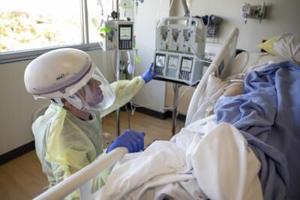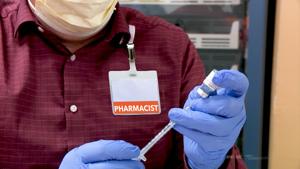
BOISE, Idaho (AP) — Idaho’s unchecked spread of the highly contagious delta variant is sending more kids and babies to hospitals with complications from COVID-19, state health care professionals said Wednesday.
Major hospitals and health care clinics in southwestern Idaho are seeing more premature babies born to COVID-19-positive mothers, more children requiring hospitalization and more kids of all ages experiencing mental health problems because of the pandemic, several doctors from Saint Alphonsus Regional Medical Center, St. Luke’s Health System, Primary Health Group and Mountain States Neonatology said during a news conference.
Numbers from the Idaho Department of Health and Welfare show weekly coronavirus case counts are increasing more rapidly in children than in adults. There were nearly 1,700 new COVID-19 cases reported in children in Idaho last week, deputy state epidemiologist Dr. Kathryn Turner said Tuesday, double the rate the state saw in August. More than 200 children have had to be hospitalized for COVID-19 since the start of the pandemic, Turner said.
Idaho remains one of the nation’s least-vaccinated states, with roughly 52% of eligible residents fully vaccinated, according to the state health department.
Lately Idaho doctors are also seeing an increase in stillbirths with no discernable medical reason other than the mother had COVID-19, said Dr. Lauren Miller, the perinatal health director at St. Luke’s Health System.
“We’ve had loss of the babies, we’ve had loss of the moms, and that is really, truly devastating,” Miller said Wednesday. “And so really we’ve just been begging and pleading for our moms and our families to trust us, and trust the information that we’re giving them that everything that we have as far as data points to very good safety information for vaccination during pregnancy as well as postpartum and during lactation.”
The U.S. Centers for Disease Control and Prevention on Wednesday issued an urgent recommendation that anyone who is pregnant, is trying to get pregnant, was recently pregnant or who is lactating to get vaccinated against COVID-19. The agency said August saw record high numbers of coronavirus-related deaths in pregnant women in a single month.
The pregnant women that Miller has been treating in intensive care units don’t have other risk factors, she said.
“They’re runners, they’re active, they have multiple children at home,” Miller said. “They are just having the bad luck of catching COVID and having the massive inflammatory response.”
The number of premature infants in Saint Alphonsus’ neonatal intensive care unit has also climbed, said Dr. Nik Shalygin with Mountain States Neonatology, many of them born to moms with COVID-19.
The babies frequently are sicker than expected for their gestational age and are staying in the NICU longer, Shalygin said. It’s particularly stressful for families, because in some cases neither the mother nor father can visit the infant in the hospital because both parents have the coronavirus, he said.
The number of kids hospitalized at St. Luke’s Children’s Hospital is about five times higher this month than in June and July, said Dr. Kenny Bramwell, a pediatric emergency physician and assistant medical director of the Boise facility.
In the summer months, St. Luke’s Health System was admitting about five pediatric patients each month. So far in September about 20 children have been admitted, Bramwell said. Still, far fewer children are being admitted with COVID-19 than adults, Bramwell said.
Dr. Jennifer King, a pediatric hospitalist at Saint Alphonsus Regional Medical Center, said the pandemic is hurting kids’ mental health too.
“One thing we’ve seen an uptick in is suicide attempts during the pandemic,” King said. “Kids are dealing with loss and grief at earlier ages, at times they shouldn’t have to, because they’re losing family members that aren’t vaccinated.”
Dr. David Peterman, a pediatrician and the CEO of Primary Health Group, said his 21 family medicine and urgent medicine clinics in southwestern Idaho see higher rates of COVID-19 cases among kids who attend school in districts that don’t require masks. And while kids generally tend to have less severe COVID-19 cases than adults, he’s had some young patients experience big impacts.
One otherwise healthy youth ended up with a pacemaker after coronavirus, and it’s not clear how long the child will need the medical device to regulate their heart. Two other children — both accomplished multi-sport athletes — have had to stop playing sports for months while they recover.



